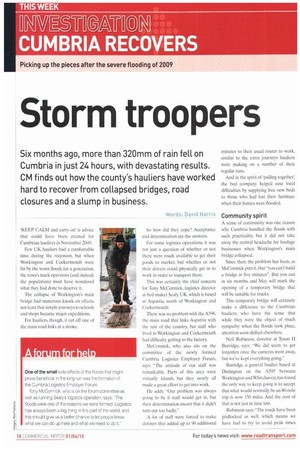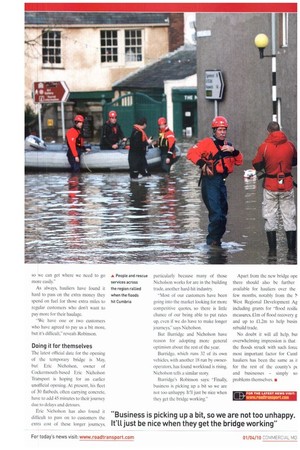Storm troopers
Page 18

Page 19

If you've noticed an error in this article please click here to report it so we can fix it.
Six months ago, more than 320mm of rain fell on Cumbria in just 24 hours, with devastating results. CM finds out how the county's hauliers have worked hard to recover from collapsed bridges, road closures and a slump in business.
'KEEP CALM and carry on' is advice that could have been created for Cumbrian hauliers in November 2009.
Few UK hauliers had a comfortable Lime during the recession, but when Workington and Cockerniouth were hit by the worst floods for a generation. the town's truck operators (and, indeed. the population) must have wondered what they had done to deserve it.
The collapse of Workington's main bridge had numerous knock-on effects, not least that simple journeys to schools and shops became major expeditions For hauliers, though, it cut off one of the main road links at a stroke. So how did they cope? Acceptance and determination are the answers.
For some logistics operations, it was not just a question of whether or not there were roads available to get their goods to market, but whether or not their drivers could physically get in to work in order to transport them.
This was certainly the chief concern for Tony McCormick. logistics director at bed-maker Sealy UK, which is based at Aspatria, north of Workington and Cockermouth.
There was no problem with the A596, the main road that links Aspatria with the rest of the country, but staff who lived in Workington and Cockermouth had difficulty getting to the factory.
McCormick, who also sits on the committee of the newly formed Cumbria Logistics Employer Forum, says: "The attitude of our staff was remarkable. Parts of this area were virtually islands. hut they nearly all made a great effort to get into work.
He adds: "Our problem was always going to be if staff would get in, but their determination meant that it didn't turn out too badly."
A lot of staff were forced to make detours that added up to 90 additional minutes to their usual routes to work, similar to the extra journeys hauliers were making on a number of their regular runs.
And in the spirit of 'pulling together', the bed company helped ease local difficulties by supplying free new beds to those who had lost their furniture when their homes were flooded.
Community spirit
A sense of community was one reason why Cumbria handled the floods with such practicality, but it did not take away the central headache for haulage businesses when Workington's main bridge collapsed.
Since then, the problem has been, as McCormick puts it, that "you can't build a bridge in five minutes". But you can in six months, and May will mark the opening of a temporary bridge that will he suitable for trucks.
This temporary bridge will certainly make a difference to the Cumbrian hauliers, who have the sense that while they were the object of much sympathy when the floods took place, attention scxm shifted elsewhere.
Neil Robinson, director at Tyson H Burridge, says: "We did seem to get forgotten once the cameras went away, but we've kept everything going."
Burridge, a general haulier based at Distington on the A595 between Workington and Whitehaven, has found the only way to keep going is to accept that what would normally be an 80-mile trip is now 150 miles. And the cost of that is not just in time lost.
Robinson says: "The roads have been gridlocked as well, which means we have had to try to avoid peak times
so we can get where we need to go more easily."
As always, hauliers have found it hard to pass on the extra money they spend on fuel for those extra miles to regular customers who don't want to pay more for their haulage.
We have one or two customers who have agreed to pay us a bit more, but it's difficult," reveals Robinson.
Doing it for themselves -11ic latest official date for the opening of the temporary bridge is May, but Eric Nicholson, owner of Cockermouth-based Eric Nicholson Transport is hoping for an earlier unofficial opening. At present, his fleet of 30 flatbeds, often carrying concrete, have to add 45 minutes to their journey due to delays and detours
Eric Nicholson has also found it difficult to pass on to customers the extra cost of these longer journeys. particularly because many of those Nicholson works for are in the building trade, another hard-hit industry.
"Most of our customers have been going into the market looking for more competitive quotes, so there is little chance of our being able to put rates up. even if we do have to make longer journeys," says Nicholson.
But Burridge and Nicholson have reason for adopting more general optimism about the rest of the year.
Burridge, which runs 32 of its own vehicles, with another 18 run by owneroperators. has found workload is rising. Nicholson tells a similar story Burridge's Robinson says: "Finally, business is picking up a bit so we are not too unhappy. It'll just be nice when they get the bridge working."
Apart from the new bridge ope there should also be further available for hauliers over the few months, notably from the Is West Regional Development Ag including grants for "flood resilit measures, Elm of flood recovery g and up to £1.2m to help husin rebuild trade.
No doubt it will all help, but overwhelming impression is that the floods struck with such force most important factor for Cuml hauliers has been the same as ii for the rest of the county's ix and businesses — simply so problems themselves.






























































































































































































